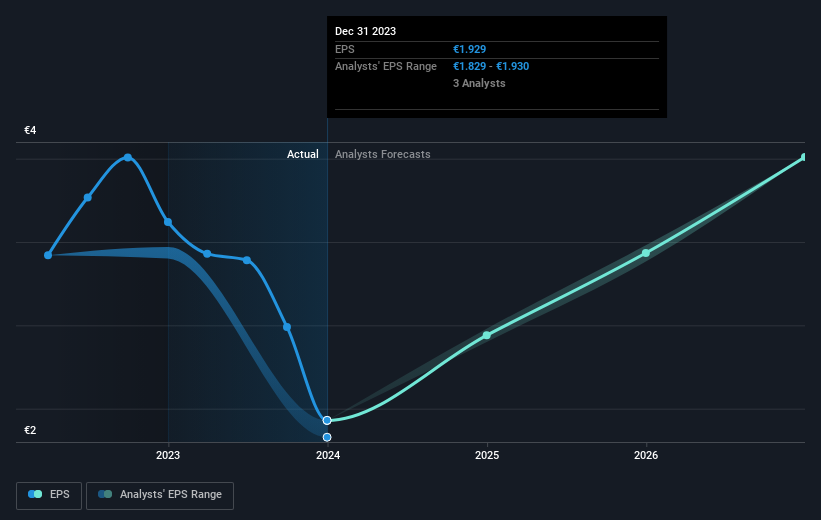While not a mind-blowing move, it is good to see that the Gesco SE (ETR:GSC1) share price has gained 10% in the last three months. But that is minimal compensation for the share price under-performance over the last year. After all, the share price is down 32% in the last year, significantly under-performing the market.
It’s worthwhile assessing if the company’s economics have been moving in lockstep with these underwhelming shareholder returns, or if there is some disparity between the two. So let’s do just that.
View our latest analysis for Gesco
While the efficient markets hypothesis continues to be taught by some, it has been proven that markets are over-reactive dynamic systems, and investors are not always rational. One imperfect but simple way to consider how the market perception of a company has shifted is to compare the change in the earnings per share (EPS) with the share price movement.
Unfortunately Gesco reported an EPS drop of 38% for the last year. This proportional reduction in earnings per share isn’t far from the 32% decrease in the share price. Given the lower EPS we might have expected investors to lose confidence in the stock, but that doesn’t seemed to have happened. Rather, the share price is remains a similar multiple of the EPS, suggesting the outlook remains the same.
The company’s earnings per share (over time) is depicted in the image below (click to see the exact numbers).
It is of course excellent to see how Gesco has grown profits over the years, but the future is more important for shareholders. Take a more thorough look at Gesco’s financial health with this free report on its balance sheet.
What About Dividends?
It is important to consider the total shareholder return, as well as the share price return, for any given stock. The TSR incorporates the value of any spin-offs or discounted capital raisings, along with any dividends, based on the assumption that the dividends are reinvested. So for companies that pay a generous dividend, the TSR is often a lot higher than the share price return. We note that for Gesco the TSR over the last 1 year was -29%, which is better than the share price return mentioned above. The dividends paid by the company have thusly boosted the total shareholder return.
A Different Perspective
While the broader market gained around 4.6% in the last year, Gesco shareholders lost 29% (even including dividends). Even the share prices of good stocks drop sometimes, but we want to see improvements in the fundamental metrics of a business, before getting too interested. Unfortunately, last year’s performance may indicate unresolved challenges, given that it was worse than the annualised loss of 3% over the last half decade. We realise that Baron Rothschild has said investors should “buy when there is blood on the streets”, but we caution that investors should first be sure they are buying a high quality business. I find it very interesting to look at share price over the long term as a proxy for business performance. But to truly gain insight, we need to consider other information, too. To that end, you should be aware of the 2 warning signs we’ve spotted with Gesco .
We will like Gesco better if we see some big insider buys. While we wait, check out this free list of growing companies with considerable, recent, insider buying.
Please note, the market returns quoted in this article reflect the market weighted average returns of stocks that currently trade on German exchanges.
Have feedback on this article? Concerned about the content? Get in touch with us directly. Alternatively, email editorial-team (at) simplywallst.com.
This article by Simply Wall St is general in nature. We provide commentary based on historical data and analyst forecasts only using an unbiased methodology and our articles are not intended to be financial advice. It does not constitute a recommendation to buy or sell any stock, and does not take account of your objectives, or your financial situation. We aim to bring you long-term focused analysis driven by fundamental data. Note that our analysis may not factor in the latest price-sensitive company announcements or qualitative material. Simply Wall St has no position in any stocks mentioned.






